Swiss cuts itself down to size
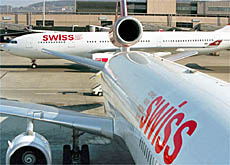
Switzerland's national carrier, Swiss, is to axe 700 jobs and cut its fleet by 20 aircraft in a bid to stay airborne.
Analysts have long said the airline is too big for its home market, and that cuts are needed if it is to avoid the same fate as the collapsed Swissair.
Announcing the cuts in Zurich, chief executive André Dosé said they were in response to weak markets – a problem afflicting the entire aviation industry.
The airline said 17 regional aircraft would be slashed from the fleet as well as two Boeing MD-83s and one Airbus A-321. The measures will reduce the overall number of seats by 13 per cent.
Swiss chairman, Pieter Bouw said that the board regretted the measures, which will lead to the loss of 700 jobs. “We have to react fast to save our future.”
Dosé added that Swiss could no longer endure the scale of the market collapse in Europe.
He said the biggest impact on the airline had been felt in Germany, where sales had fallen by 30 per cent, and in Britain. “We have suffered from the impact of low cost airlines [in Britain].”
Dosé added that Swiss’s “most important segment” in London – the finance industry – had shrunk dramatically because of the economic downturn.
“All airlines have seen credit card sales down 30 per cent in December.”
He added that the airline would give a full picture of its financial position when it files its 2002 results in March, but said the company no longer expected to reach its financial target of breaking even in 2002.
Too big
The Swiss finance ministry reacted to the job cuts, saying that while the measures were tough and cut deep, they were also necessary to keep the company viable.
The Swiss government is the airline’s biggest shareholder.
The unions representing the company’s pilots, cabin crew and ground staff said they were shocked by the extent of the cuts. The president of the ground personnel’s union, Philipp Hadorn, called the job losses “tragic”.
Olivier Chamot, of Swiss Pilots, said that the personnel were paying the price for bad management. He added that axing some flights would probably not be sufficient to keep the company afloat.
“To join a major airline alliance, Swiss will have cut down on intercontinental flights,” he said.
Since its launch last April, Swiss has been criticised for being too large for its domestic market.
“It’s a very tough environment for the whole industry,” said Patrick Schwendimann, financial analyst at Zurich Cantonal Bank. “Everybody is losing money right now and I would say that Swiss is still too big for this current environment.”
The already battered aviation industry is facing a bleak few months ahead as war looms in Iraq.
The conflict could hit hard Swiss’s routes to the Middle East, many of which are profitable.
But Dosé said that, ironically, the threat of war had so far helped slightly because “Business prefers to fly on a neutral airline”.
Strategy
As to whether the airline might need to make further cuts in its fleet, Schwendimann said Swiss’s ability to reduce its planes was restricted by its strategy.
“Should it decide to keep its strategy of a major hub in Zurich, then it’s not possible to make huge cuts because it needs a big fleet. But if it changes its strategy then it could make bigger cuts.
“The strategy is to be a premium airline and that’s also not that easy because you have high expectations from your customers and to fulfil those in this environment is not an easy task,” Schwendimann said.
Aviation analyst, Sepp Moser, told swissinfo on Tuesday that the fundamental problem with Swiss was the number of long haul flights.
He said Finland’s national carrier serves six long-haul destinations compared with Swiss which serves 40, despite the fact that the countries are of a similar size.
“This is a political airline,” he said. “The airline was not wanted by the market. Swissair after all went bankrupt.”
Easy savers
Beyond the hub issue, Swiss has sent out mixed signals about its positioning in the market.
It started life less than a year ago by selling itself as a premium service airline, but has lately been trying to maintain market share by offering low-cost flights.
The company denies the move marks a major change in strategy. It says the carrier remains a premium airline and that “Easy savers” – as the cheap tickets are called – is merely a way of selling “extra capacity at an attractive price for new customers”.
But René Lüchinger, a leading aviation expert, warns that the move is likely to alienate premium customers and confuse the company’s shareholders.
“In the long run, it’s a very dangerous strategy because if you want to be a premium airline, you can’t compete with the low-cost carriers,” Lüchinger told swissinfo in a recent interview.
“You must decide if you want to be a premium airline with a good service and higher prices or whether you want to be low cost. I think to be both is impossible.”
Alliance
Swiss was created last April by merging two-thirds of the fleet of grounded Swissair and the regional carrier, Crossair, with the help of a SFr2.7 billion ($1.9 billion) cash injection by the Swiss government and a host of Swiss companies.
One reason for the large size of the fleet – which will still number 111 planes from March 30 when the cuts take effect – was because the Swiss government wanted to limit job losses after the collapse of Swissair.
In November, Swiss already cut its fleet by eight planes.
However, the size of the fleet is still seen as a hindrance for a link with the Oneworld alliance which includes British Airways and American Airlines.
Becoming a member would allow Swiss to save costs through improved network coordination and joint marketing, as well as boost passengers and raise profits.
Without membership, the Swiss carrier will struggle to find the SFr400 million in cost savings it needs to break even for 2003 after suffering a loss in 2002.
Even that SFr400 million was based on assumptions of an economic recovery in 2003 which now seems far away.
Shares in Swiss have collapsed in recent days and set an all-time low of SFr6 on Tuesday – and this after Swiss shed nearly three-quarters of its value in 2003 and more than half in 2002.
However, with 90 per cent of shares held by investors who have agreed to a lock-up until August 2004, the free float is very small and the price therefore volatile.
swissinfo, Samantha Tonkin
Some 700 jobs will axed: 200 among cockpit crews, 200 from cabin crews and 300 managers and ground staff.
The number of destinations served will also be cut, as will several routes.
Swiss airports at Zurich, Geneva, Basel, Bern and Lugano will all be affected.
The changes come into effect with the introduction of the summer timetable on March 30.

In compliance with the JTI standards
More: SWI swissinfo.ch certified by the Journalism Trust Initiative
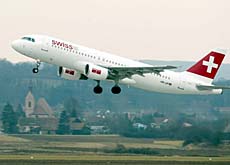
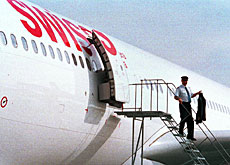
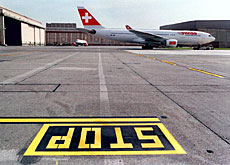
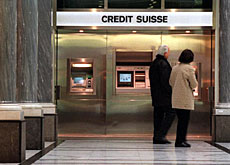
You can find an overview of ongoing debates with our journalists here. Please join us!
If you want to start a conversation about a topic raised in this article or want to report factual errors, email us at english@swissinfo.ch.